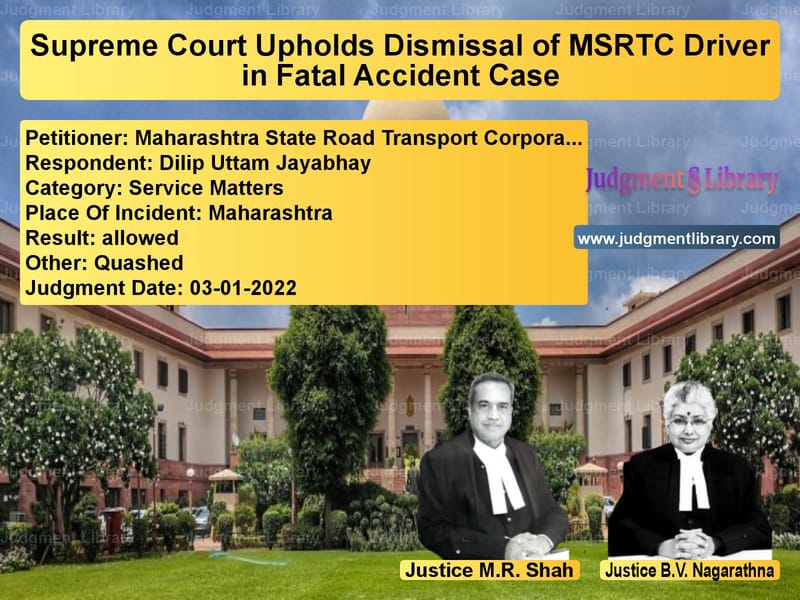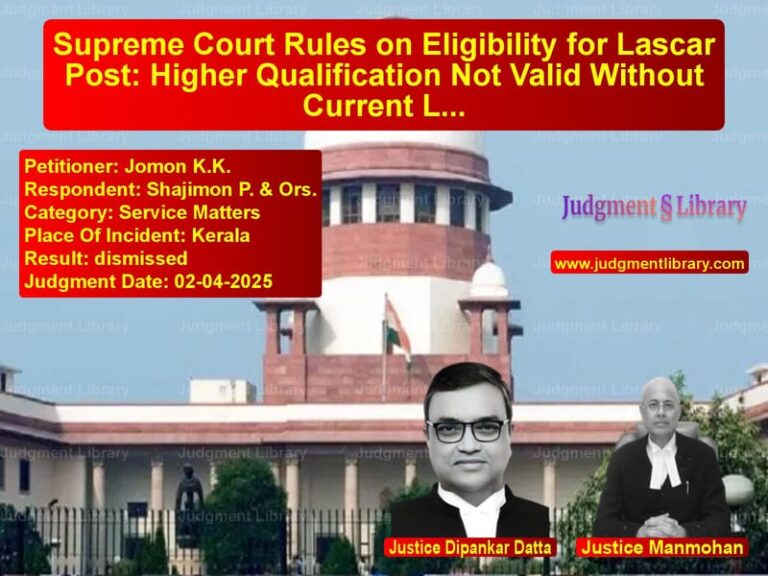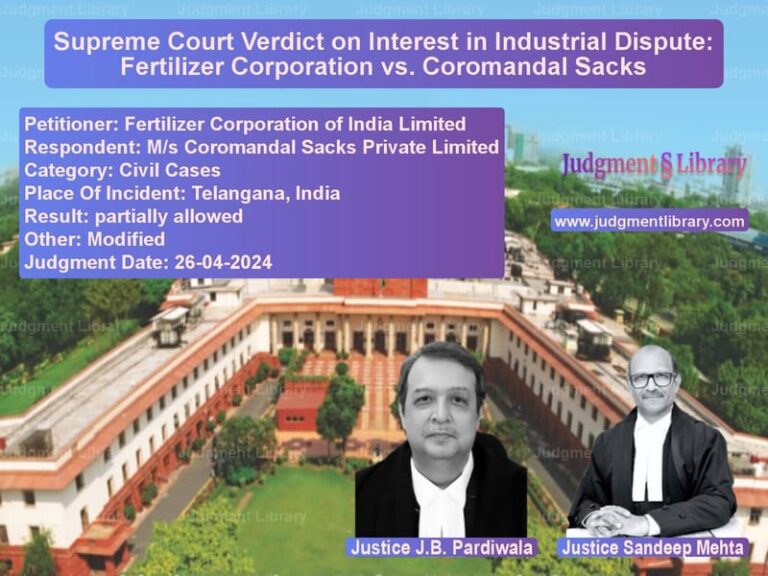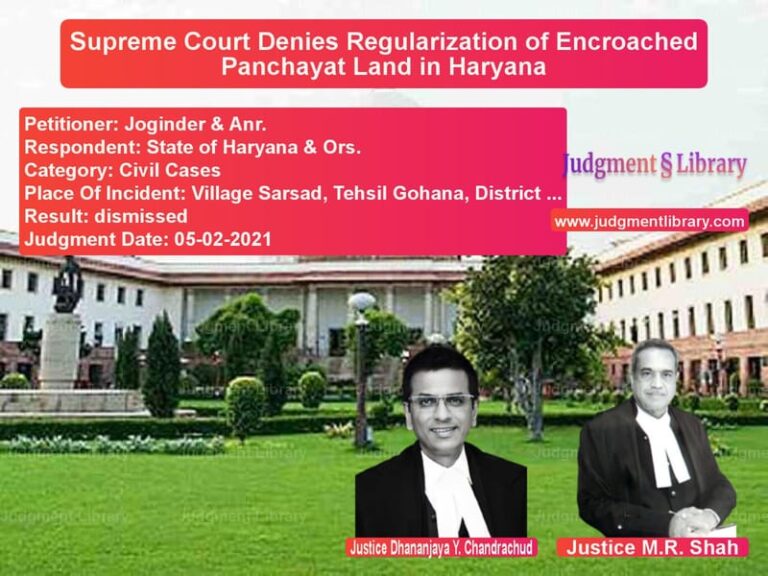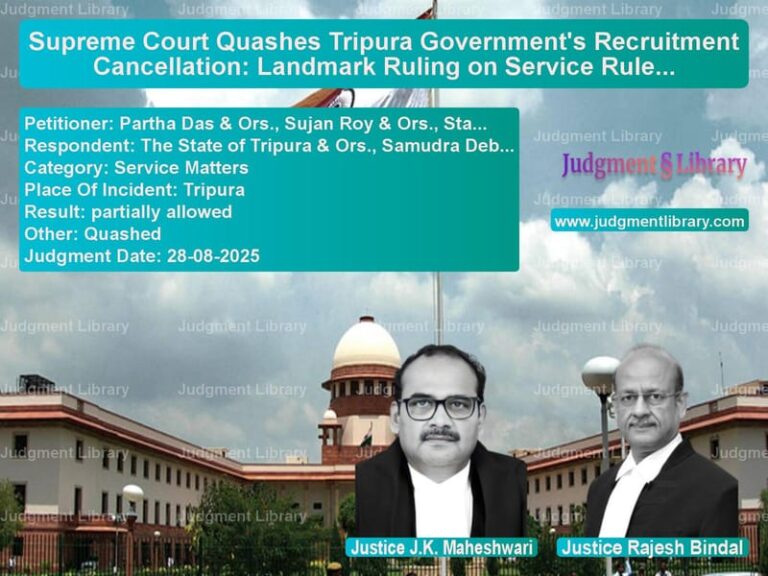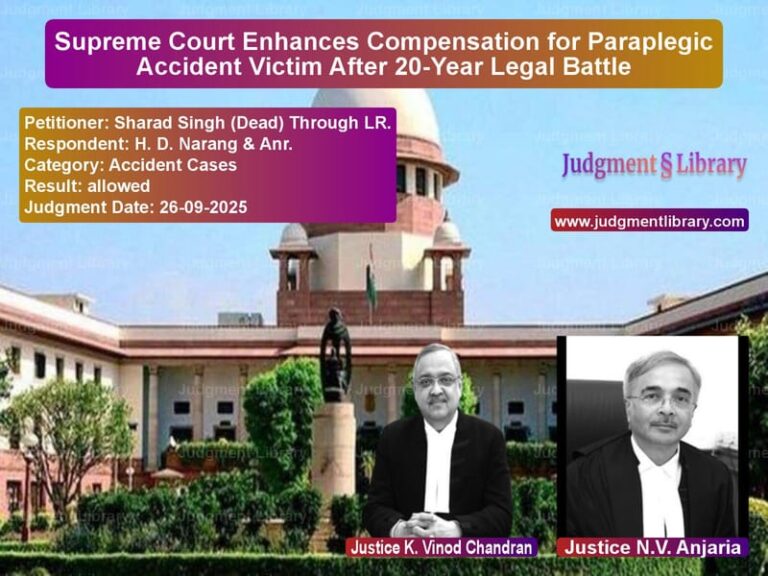Supreme Court Upholds Dismissal of MSRTC Driver in Fatal Accident Case
The case of Maharashtra State Road Transport Corporation (MSRTC) vs. Dilip Uttam Jayabhay is a crucial ruling on labor law and employer disciplinary actions. The Supreme Court upheld the dismissal of a bus driver whose reckless driving led to a fatal accident, rejecting the orders of the Industrial Court and the Bombay High Court, which had reinstated him with continuity of service and back wages.
This judgment reinforces the importance of accountability in public transportation services and establishes a clear legal precedent regarding the scope of judicial interference in disciplinary matters.
Background of the Case
The respondent, Dilip Uttam Jayabhay, was employed as a bus driver with MSRTC. On October 23, 1992, while driving a passenger bus, he caused a serious accident by steering the vehicle onto the wrong side of the road. The bus collided head-on with a jeep, resulting in the deaths of four passengers and serious injuries to six others. The jeep was severely damaged, and its driver was also injured.
Following an inquiry, MSRTC dismissed the respondent from service, citing reckless driving and gross negligence. Simultaneously, he was prosecuted under Section 279 of the Indian Penal Code (IPC). However, he was acquitted in the criminal case due to lack of sufficient evidence.
Despite the acquittal, the disciplinary proceedings against him found him guilty of misconduct. The respondent challenged his dismissal before the Labour Court, which upheld MSRTC’s decision. However, in a revision application, the Industrial Court overturned the dismissal, citing unfair labor practice and ordering his reinstatement without back wages but with continuity of service. MSRTC challenged this decision in the Bombay High Court, which not only upheld the Industrial Court’s ruling but also directed MSRTC to pay back wages from November 1, 2003, to May 31, 2018, the date of his retirement, along with retirement benefits.
Arguments of the Petitioner (MSRTC)
MSRTC contended that:
- Difference Between Criminal and Disciplinary Proceedings: The respondent’s acquittal in the criminal case was irrelevant to the disciplinary proceedings since the standards of proof are different. While criminal guilt must be proven beyond a reasonable doubt, disciplinary actions are based on the preponderance of evidence.
- Severity of the Misconduct: The accident resulted in multiple deaths and injuries due to the respondent’s negligence. The Industrial Court and the High Court erred in treating the case as a minor or technical lapse.
- Precedents Supporting MSRTC’s Case: The corporation cited Samar Bahadur Singh vs. State of U.P. and Union of India vs. Sitaram Mishra, which held that an acquittal in a criminal case does not automatically entitle an employee to reinstatement in disciplinary matters.
- Past Record of the Respondent: During his three-year tenure, the respondent had been penalized four times for misconduct, indicating habitual negligence.
- Unwarranted Interference: The Industrial Court and the High Court overstepped their jurisdiction by interfering with the punishment imposed by MSRTC, which was well within its rights as an employer.
Arguments of the Respondent (Dilip Uttam Jayabhay)
The respondent countered MSRTC’s claims by arguing:
- Contributory Negligence: The accident was not solely his fault, as the jeep driver was also negligent.
- Acquittal in Criminal Case: His acquittal in the criminal trial indicated that there was no conclusive evidence against him.
- Unfair Labor Practice: His dismissal was disproportionate to the alleged misconduct and violated the Maharashtra Recognition of Trade Unions and Prevention of Unfair Labour Practices Act (MRTU & PULP Act, 1971).
- Financial and Career Hardship: He had already been out of employment for years, and reinstatement with full benefits was necessary to compensate for the loss.
Supreme Court’s Observations
The Supreme Court, comprising Justices M.R. Shah and B.V. Nagarathna, made the following key observations:
- Misconduct Was Well Established: The disciplinary proceedings had conclusively established that the respondent’s negligence led to the accident.
- Acquittal Does Not Guarantee Reinstatement: The respondent’s acquittal in the criminal case did not mean he was innocent of misconduct under labor laws.
- Standard of Proof in Disciplinary Proceedings: The Court reiterated that disciplinary actions follow a lower threshold of proof than criminal trials, making the acquittal irrelevant.
- Industrial Court’s Overreach: The Court criticized the Industrial Court for setting aside the dismissal solely on the grounds that the punishment was disproportionate, despite the serious nature of the misconduct.
- High Court’s Error: The Supreme Court held that the High Court went beyond its jurisdiction by awarding back wages and retirement benefits in a case filed by MSRTC, which was not even a claim raised by the respondent.
Final Judgment
The Supreme Court set aside the judgments of the Industrial Court and the Bombay High Court, reinstating the dismissal order passed by MSRTC. The ruling stated:
“The present Appeal Succeeds. The judgment and order passed by the Industrial Court in Revision Application (ULP) No.13 of 2002 and the impugned judgment and order passed by the High Court in Writ Petition No.8401 of 2003 are hereby quashed and set aside.”
Implications of the Judgment
This ruling has several important implications:
- Limits on Judicial Interference: It reinforces that courts should not interfere with employer-imposed punishments unless there is clear evidence of victimization or procedural unfairness.
- Precedence for Public Sector Employees: The judgment affirms that employees in public transport services, responsible for public safety, must be held to high standards of conduct.
- Clarification on Acquittals and Disciplinary Actions: The ruling clarifies that an acquittal in a criminal case does not automatically entitle an employee to reinstatement in a disciplinary action.
- Strengthening Employer Rights: The decision empowers employers, particularly in safety-sensitive sectors, to take strict action against negligence without undue interference from labor courts.
With this ruling, the Supreme Court has reinforced the principle that disciplinary actions against negligent employees must be upheld to ensure accountability, particularly in professions where public safety is at stake.
Petitioner Name: Maharashtra State Road Transport Corporation.Respondent Name: Dilip Uttam Jayabhay.Judgment By: Justice M.R. Shah, Justice B.V. Nagarathna.Place Of Incident: Maharashtra.Judgment Date: 03-01-2022.
Don’t miss out on the full details! Download the complete judgment in PDF format below and gain valuable insights instantly!
Download Judgment: maharashtra-state-ro-vs-dilip-uttam-jayabhay-supreme-court-of-india-judgment-dated-03-01-2022.pdf
Directly Download Judgment: Directly download this Judgment
See all petitions in Employment Disputes
See all petitions in Termination Cases
See all petitions in Disciplinary Proceedings
See all petitions in Judgment by Mukeshkumar Rasikbhai Shah
See all petitions in Judgment by B.V. Nagarathna
See all petitions in allowed
See all petitions in Quashed
See all petitions in supreme court of India judgments January 2022
See all petitions in 2022 judgments
See all posts in Service Matters Category
See all allowed petitions in Service Matters Category
See all Dismissed petitions in Service Matters Category
See all partially allowed petitions in Service Matters Category

